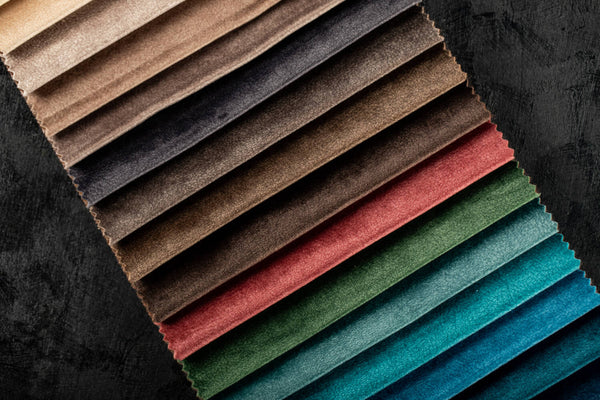Benefits of Using Sustainable Fabric Swatches
Choosing sustainable fabric swatches over virgin synthetics yields multidimensional advantages:
Reduced Environmental Footprint
Sustainable fabric swatches are made from natural or recycled materials, reducing the need for synthetic fibres that harm the environment. They require less water and energy to produce and decompose naturally, reducing landfill waste. By choosing sustainable fabrics, we can significantly reduce our environmental footprint.
Positive Social Impact
Sustainable fabrics often have a positive social impact. They are typically sourced and produced through fair trade practices, which ensure fair wages and safe working conditions for workers. By choosing sustainable fabrics, we support ethical labour practices and contribute to the betterment of communities involved in their production.

Exploring Different Sustainable Fabric Swatches
Organic Cotton: Grown without harmful chemicals, offering softness and breathability.
Hemp: Known for its durability and resistance to UV light and mould.
Bamboo: Fast-growing and requires less water than cotton. It’s hypoallergenic and has antibacterial properties.
Recycled Polyester: Produced from recycled plastic bottles, reducing plastic waste.
Linen: Made from flax plant, it’s lightweight and has a unique texture.
Tencel: Produced from sustainably sourced wood, it’s soft, breathable, and biodegradable.
Wool: Natural, renewable, and biodegradable, it’s perfect for cold weather clothing.
Silk: Natural and biodegradable, it’s known for its luxurious feel.
Jute: Durable, biodegradable, and affordable, it’s often used for bags and rugs.
Pinatex: Made from pineapple leaves, it’s a sustainable alternative to leather.
Exploring these different swatches can help you find the perfect sustainable fabric.
Characteristics and Benefits
Each type of sustainable fabric has its unique qualities and advantages. For example, organic cotton is soft, breathable, and hypoallergenic, making it perfect for clothing. On the other hand, hemp is incredibly durable and resistant to UV light and mould.
Unique Qualities and Advantages
Sustainable fabrics benefit the environment and society and offer unique qualities that are advantageous for consumers. They are often more durable, comfortable, and breathable than their synthetic counterparts. They come in various textures and colours, adding a unique aesthetic appeal to any fashion item.
Sustainable fabric swatches offer numerous benefits, from reducing environmental impact to promoting social welfare and providing unique advantages to consumers. They represent a notable step towards a more sustainable and ethical fashion industry.
Impact on Fashion Design and Production
The shift towards sustainable fashion has impacted design and production processes. Designers now incorporate eco-friendly fabric swatches early on to plan collections with recycled, organic and non-toxic materials. Digital sampling helps reduce waste. Production has moved towards eco practices like local sourcing, clean manufacturing, energy efficiency and waste reduction. But the transition has challenges, too.
Lead times increase as sustainable fabrics can be more complex to procure. Prices are higher. Consistency in quantity and quality control needs improvement. However, innovations are emerging to tackle these. New technologies are improving the efficiency of producing sustainable fabrics, while novel business models are making eco-friendly fashion more accessible and affordable, thus amplifying the impact of sustainable fabric swatches.
Read more: TradeUNO - A Top Clothing Brand in India For All Fabric Requirements

The Role of Consumers with Eco-Friendly Fabric Swatches at TradeUNO
Consumers play a crucial role in driving eco-fabric adoption by demanding sustainable products. TradeUNO makes this easier by providing designers and buyers access to curated swatches of certified organic, recycled and non-toxic fabrics.
Consumers can make informed choices with information on material composition, certifications, properties, etc. Our swatches in wool, cotton, linen, hemp and other eco-fibres showcase various textile effects for creativity. Consumers drive change across the value chain by supporting green designers and influencing brands through their purchasing power.
FAQ about Fabric Swatches
1. How are eco-friendly fabrics different from regular fabrics?
Ans: They are made from organic fibres, recycled waste materials or non-toxic dyes using environmentally responsible production. This reduces environmental impact.
2. Are sustainable fabrics as good in quality as fast fashion fabrics?
Ans: Yes, materials like organic cotton, recycled polyester, linen, etc., offer durability, comfort and versatility like regular fabrics.
3. Does sustainable fashion cost more?
Ans: Eco-fabrics have higher prices, but costs will likely decrease as production climbs to meet demand.
4. Where can I buy sustainable fabrics as a designer?
Ans: Curated B2B platforms like TradeUNO offer various eco-friendly fabric swatches for designers to purchase samples and yardage.
5. How can I incorporate sustainability as a consumer?
Ans: Choose for eco-fashion brands, choose durable classics over fast fashion, recycle and repair garments, and buy eco-fabrics to sew your clothes.
 Call Us
Call Us
